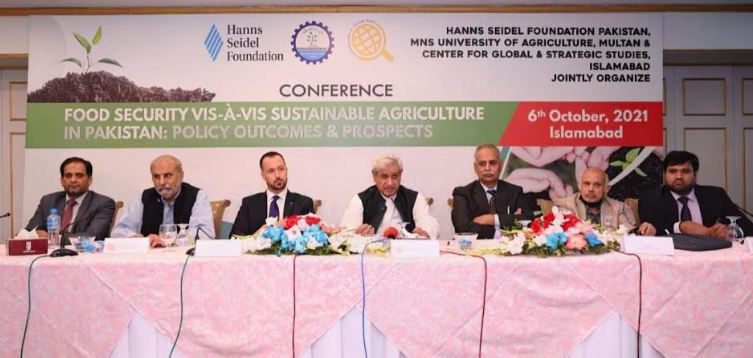ISLAMABAD, OCT 6 /DNA/ – Center for Global & Strategic Studies (CGSS), Islamabad, Hanns Seidel Foundation Pakistan & MNS University of Agriculture, Multan jointly organized conference on “Food Security vis-à-vis Sustainable Agriculture in Pakistan: Policy Outcomes and Prospects” at Margala Hotel, Islamabad.The Conference is a follow up to the Roundtable Discussion organized in July at Multan. The Conference highlighted and discussed food security vis-à-vis agriculture productivity in Pakistan. The Conference focused to devise coherent policies to curb the deficit to maintain and sustain the food supply chain by enhancing agriculture growth.
The Conference commenced with the opening remarks of Mr. Ashfaq Ahmed Gondal, Former Federal Secretary of Information and Broadcasting and Vice President (Federal Region), Center for Global & Strategic Studies (CGSS), Islamabad. He stated that food security is directly related to agriculture and agriculture is the backbone of Pakistan. This sector accounts for 19% of the GDP and the export of agro-based products comprise of the 80% of Pakistan’s export.
Dr. Steffen Kudella, Resident Representative, Hanns Seidel Foundation Pakistanin his welcome remarks and stated that food security means everyone has access to sufficient and safe food even in times of crisis.Food Security is a serious non-traditional security challenge globally and for Pakistan, because many households suffer from food insecurity as per a recent study.This becomes particularly serious for children. Even though Pakistan already has a comparatively strong food production sector, itsagricultural potential is much bigger and needs to be used for its people.Dr, Kudella stated that our Conference intends to connect relevant stakeholdersfrom the farmer in the field to the highest level of policymakers. We want to provide constructive suggestions to policy makers that are based on research and evidence.
Chief Guest of the Conference His Excellency Syed Fakhar Imam, Federal Minister for National Food Security and Research, Government of Pakistan stated that it is a privilege and honor to be amongst the leading agriculture experts and scientists. Pakistan is a country blessed with the agro-economic zones. We have one of the most extensive irrigation system in the world. Currently, we are using 1/4th of our geographical land for cultivation of five major crops which is still dominated by wheat. 38% of our population is employed in the agro-economic sector which increases the significance of this sector. Pakistan has incomparable taste ad aroma of fruits which cannot be found in any other part of the world. His Excellency stated that Pakistan needs to upgrade agriculture sector through use of modern technology. We can apply different methodologies on smaller areas and that can be replicated on larger scale upon success to multiply its benefits for the people of Pakistan. We have youth that is committed to take agroeconomic sector to new heights. 60% of our total exports depends upon cotton and 70% of the edible oil comes from cotton. This year, we had record production in many crops and by next year more people would invest in this sector.
Guest of Honor of the Conference His Excellency Syed Hussain JahaniaGardezi, Provincial Minister of Punjab for Agriculture, Government of Pakistanstated that as far as food security is concerned, it has always remained a threat to mankind. Various scientists and philosophers have also been warning about the threats related to food, agriculture security and climate change. Food security threat has always existed; however, the dimensions of this threat have changed due to other factors particularly climate change. Pakistan is the 10th largest country to produce agriculture commodities, at the same time, we are the 6th largest country by population. If we compare, the world food growth is not more than 1.5%. Therefore, the policymakers must come up with innovative ideas to bridge this gap. Pakistan is a signatory of Sustainable Development Goals and has committed to provide safe and healthy food to its citizens and I hope that our policymakers, academia and scientist will put efforts to fulfill our nations requirements.
Prof. Dr. Asif Ali (TI), Vice Chancellor, MNS University of Agriculture, Multan stated that today’s Conference covers all the important aspects and we have competent speakers who will share their expert opinions. In 21st century, nontraditional threats have risen. The road to the progress of food security has been bumpy but, the improvements have been tremendous. He stated that we should have production diversity and environmental sustainability. We must educate people regarding eating habits an achieving balance in food consumption. Traditional and nontraditional threats are interconnected. On threat destabilizes the other and changing climate is the biggest challenge to food security.
Prof. Dr. Usman Mustafa, Team Leader, Barani Water Conservation Project, ME&I Consultants MFS&R, Government of Pakistanstated that food security means everyone has at all times, access to and control over sufficient quantities of good quality food for an active, healthy life. More than any other sector, agriculture is the common thread which holds the 17 SDGs together. Investing in this sector can address notonly hunger and malnutrition but also other challenges including poverty; water and energy use;climate change; and unsustainable production andconsumption. He stated that there is lot of scope with minimum investment. Reduce poverty and increase employment.
Dr. ShehzadKousar, Assistant Professor, COMSATS University, Islamabad highlighted food security and nutritional status: Gender perspective in Pakistan. She stated that to achieve SDG 2 of zero hunger and improving food security, the Government of Pakistan is promoting gender-balanced agricultural development by improving women’s capacity to increase food production and agricultural value addition. There is either need to reduce productive burdens of women or need to compensate her work with better wages or food packages.The results from our study suggest that increased time to productive tasks by a woman diminishes her time for reproductive and non-productive tasks that ultimately leads to reduce household food security status.Our findings would help policy makers to understand and plan to reduce unintended negative nutritional consequences of increasing women productivity through agricultural interventions.
Ms. Manahal Fatima, AWF Foundation, Islamabad gave presentation onFood Systems for Adolescents in Pakistan. The presentation focused on prioritizingadolescent nutrition. Poor nutrition during adolescent can lead to higher morbidity rates, decreased well-being, and intergenerational cycle of malnutrition. It was stated that adolescents at more risk to food insecurity than children. Challenges to food security includes contaminated food supplies, inappropriate food storage, unhygienic sources, inadequate monitoring, poor personal hygiene and foodborne illnesses.
Dr. AftabAlam, International Development Consultant gave presentation on Agriculture development issues and policy ramifications in Pakistan. He stated that Pakistan regularly falls under top 10 worst affected countries of Climate Change. Pakistan experienced 126 heatwaves between 1997 and 2015. Climate Change has shaken the fundamentals of agriculture system and we must take adequate measures for adaptation and mitigation. Paradigm shift is requiredin Government policies and programs, curriculum, research in universities and think tanks and agricultural extension system. There is a need to take significant steps to facilitate private sector to contribute towards adaptation and mitigation.
Prof. Dr. WaqarAkram, Professor of Economics, Institute of Business Administration (IBA), Sukkur presented speech on Sustainable agriculture for food security: policy perspective in Pakistan. He stated that agriculture has changed intensely since Green Revolution.Food productivity wheeled due tonew technologies, mechanization, increased chemical use, specialized production, Government support policies and irrigation system. This has allowed farmers to produce more food at lower prices for food security.Sustainable agriculture cannot be ensured without resilience., adaptability and diversity. Resilience from economic shocks, political contexts, and others that are often highly unpredictable and rarely stable in the long run. Adaptability is related to be able to adjust itself and take a new form in the face of changing conditions.The more variety exists within a food system, the more tools and avenues a system will have to adapt to change.
Dr Muhammad Abid, Senior Advisor Adaptation to Climate Change and Climate Services, GIZ Pakistanhighlighted technological transformation and agriculture sector in Pakistan. He stated that transformation is required not only to meet growing food demands but also to manage challenges of climate change, urbanization, deteriorating natural resources and loss of biodiversity. Agricultural innovation in Pakistan is rapidly evolving with the introduction of modern tools. He stated that updated climate-smart profiles at national and sub-national level providing the current status and gaps in the adoption of climate-smart agriculture practices covering food security, productivity and mitigation aspects.
Dr. Mubashir Mehdi, Associate Professor and Director Business Incubation Center, MNS University of Agriculture, Multanpresented speech on Food supply chain system: Risks Analysis and way forward for Pakistan. He stated that Sustainable Food Supply Chainis a market-oriented and systems-based approach for measuring, analyzing and improving the performance of food value chains (FVCs) in ways that help ensure their economic, social and environmental sustainability. He stated that commodity-based Supply/value chain case studies can be kept up to date and used to illustrate contemporary issues. Value chain research is an important emerging field of theory and practice and it is inclusive because it requires cross-disciplinary teams.
Dr. Mehmood Ahmad, Professor of Practices at Water Informatic Centre, Lahore University of Management Science and Former Advisor, Food and Agriculture Organizationstated that it is a national challenge to revisit conventional agricultural practices and shift focus on to small-farmer prosperity to sustainably, enhance their domestic and global competitiveness, ensure rural development and protect livelihoods, decrease per acre cost without compromising output, mitigate the effects of rural-urban migration and minimize the environmental impacts of input-heavy agricultural activity. Policy makers must explore and implement nature-based solutions for climate-smart agriculture systems. Government supports through a variety of means such as setting up model farms, regulations, economic incentives capacity building, communications and providing an enabling environment for the private sector to develop a value chain across this production system.
The Conference was attended by approximately 75 participants and was moderated by Ms. Laraib Fatima Hassan, Communication Executive, CGSS.

















